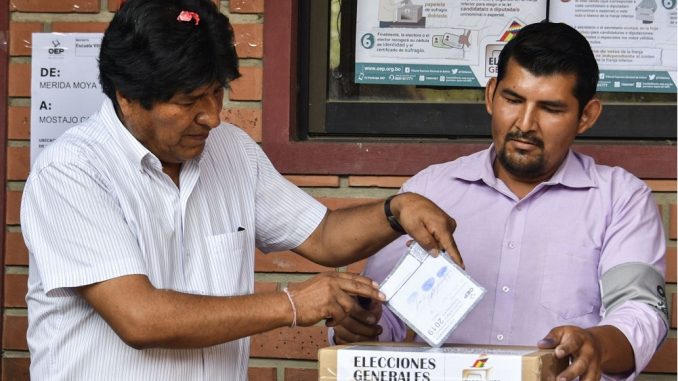
An acute
political crisis has opened in Bolivia after the presidential elections of
October 20. President Evo Morales announced his victory by a margin of just
over 10%, with which he would win in the first round. The main opposition
candidate, Carlos Mesa denounced fraud and demands the celebration of a second
round, and Evo responded that it is an attempted coup d’etat. Mobilizations and
clashes broke out between the two sides, each claiming to defend democracy, and
the country fell into a strong institutional and legitimacy crisis.
Evo Morales reached this election with an advanced
deterioration of his social base and general legitimacy. Shortly after assuming
the presidency he betrayed the October Program of the 2000 and 2003 revolutions
that overthrew Sánchez de Lozada and brought Evo´s MAS to power, by agreeing
with the right and capitalists on approving the Political Constitution of the
State, passing over the 2008 Constituent Assembly.
Since then, although delivering concessions to the
mass movement and increasing the state´s participation in the economy, Evo has
positioned himself as guarantor of capitalist business in Bolivia, maintaining
the dependent and extractivist economic model. This led him to collide and
break with sectors of the working class and the indigenous peasantry that makes
up the bulk of his social base. A central expression of this rupture has been
the state repression and criminalization of social protest, including against
miners and coca growers in northern La Paz, who already have more than 200
prosecuted peasants.
In 2016 Evo called a referendum to modify the
constitution and enable his third re-election, which he ended up losing. But
the following year, the Plurinational Constitutional Court ignored the
referendum and declared the articles of the Constitution that prevent a second
reelection unconstitutional, enabling Evo to run this year for his fourth
presidential term. In this way, the president arrived at the current election
with his democratic legitimacy strongly questioned.
Carlos Mesa, meanwhile, is an exponent of the
traditional right. He was the vice president of Sanchez de Lozada himself,
assumed the presidency when Lozada was thrown out by popular mobilization in
2003 and had to resign himself after massive mobilizations against him two
years later. Today he presents himself as an alternative, but he represents
everything that has already ruled and plunged Bolivia into dependence and
poverty.
The current crisis broke out during the vote
count. Around 8:00 pm with 83.8% of votes counted, the Transmission of
Preliminary Electoral Results granted Evo Morales 45.3% of the votes, seven
points above Mesa, which implied a second round. But at that time, the Supreme
Electoral Court suspended the counting and transmission of the results, until
15 hours later, when they published the final results, which showed a drastic
change in the trend and declared Evo the winner with 47% and 10.5 points above
Mesa, which implies a win in the first round.
The announcement triggered a series of mass
mobilizations, the courts of Sucre and Potosí were set on fire and clashes
between police and protesters took place in several cities. Mesa denounced
fraud and launched a heterogeneous Defense of Democracy Coordination, on which
the old oligarchic and racist right has mounted itself, as has US imperialism.
The OAS stated that it would only recognize the result of the election if it
was subject to a “binding” audit, and “recommended” the
celebration of a second round even if Evo ends up maintaining a difference
greater than 10%. The governments of the United States, Brazil and Argentina
also demand the convening of a second round “in the event that the OAS
Electoral Observation Mission is not in a position to verify the results of the
first round.” This is a blatant interference in internal politics and
attack on the sovereignty of Bolivia.
However, mass adherence to protests is indicative
of the growing disappointment with Evo’s model. In addition to the massive
participation of students, the Federation of Neighborhood Boards of El Alto
(Fejuve), one of the protagonists of the 2003 Gas War that catapulted Evo to
power two years later, has joined the protest.
Other trade union and peasant organizations, such
as the CONALCAM, the COB and the COR, have mobilized in defense of Evo, arguing
that the opposition wants to disenfranchise the peasant and indigenous votes
that allegedly reversed the trend in the election.
Both sides raise the defense of democracy in order to sustain a system that guarantees capitalist profits over the people’s needs and rights. National Chamber of Industries is indicative in this regard. It issued a careful statement asking that the Political Constitution of the State and the Electoral Law be respected and calling on citizens to preserve the normal development of economic activity. The statement reflects that the interests of entrepreneurs feel assured whoever wins, and that they are more concerned with maintaining the stability of their businesses in the context of a global crisis that will force the next government to move forward with austerity measures similar to those that are causing social uprisings in other countries of the region, like Ecuador and Chile.
No solution in favor of workers and peasants will come from a government of Carlos Mesa or Evo Morales. The problems of the Bolivian people will not be resolved with the celebration or not of a second round. Therefore, it is essential to adopt an independent class position that rejects, in the first place, any imperialist interference in the country or coup attempt of the oligarchic right, but that also demands profound change, through a free and sovereign constituent assembly, in which Bolivian workers and peasants can discuss and decide on what political, economic and social bases to organize their country. And the construction of a working class and revolutionary alternative that fights for a government of workers and peasants and a socialist Bolivia and Latin America.
Correspondent








